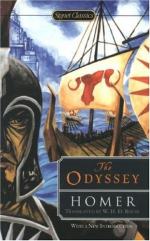To whom Antinous thus his rage express’d:
“What god has plagued us with this gourmand
guest?
Unless at distance, wretch! thou keep behind,
Another isle, than Cyprus more unkind,
Another Egypt shalt thou quickly find.
From all thou begg’st, a bold audacious slave;
Nor all can give so much as thou canst crave.
Nor wonder I, at such profusion shown;
Shameless they give, who give what’s not their
own.”
The chief, retiring: “Souls, like that
in thee,
Ill suits such forms of grace and dignity.
Nor will that hand to utmost need afford
The smallest portion of a wasteful board,
Whose luxury whole patrimonies sweeps,
Yet starving want, amidst the riot, weeps.”
The haughty suitor with resentment burns,
And, sourly smiling, this reply returns:
“Take that, ere yet thou quit this princely
throng;
And dumb for ever be thy slanderous tongue!”
He said, and high the whirling tripod flung.
His shoulder-blade received the ungentle shock;
He stood, and moved not, like a marble rock;
But shook his thoughtful head, nor more complain’d,
Sedate of soul, his character sustain’d,
And inly form’d revenge; then back withdrew:
Before his feet the well fill’d scrip he threw,
And thus with semblance mild address’d the crew:
“May what I speak your princely minds approve,
Ye peers and rivals in this noble love!
Not for the hurt I grieve, but for the cause.
If, when the sword our country’s quarrel draws,
Or if, defending what is justly dear,
From Mars impartial some broad wound we bear,
The generous motive dignifies the scar.
But for mere want, how hard to suffer wrong!
Want brings enough of other ills along!
Yet, if injustice never be secure,
If fiends revenge, and gods assert the poor,
Death shall lay low the proud aggressor’s head,
And make the dust Antinous’ bridal bed.”
“Peace, wretch! and eat thy bread without offence
(The suitor cried), or force shall drag thee hence,
Scourge through the public street, and cast thee there,
A mangled carcase for the hounds to tear.”
His furious deed the general anger moved,
All, even the worst, condemn’d; and some reproved.
“Was ever chief for wars like these renown’d?
Ill fits the stranger and the poor to wound.
Unbless’d thy hand! if in this low disguise
Wander, perhaps, some inmate of the skies;
They (curious oft of mortal actions) deign
In forms like these to round the earth and main,
Just and unjust recording in their mind,
And with sure eyes inspecting all mankind.”
Telemachus, absorb’d in thought severe,
Nourish’d deep anguish, though he shed no tear;
But the dark brow of silent sorrow shook:
While thus his mother to her virgins spoke:
“On him and his may the bright god of day
That base, inhospitable blow repay!”
The nurse replies: “If Jove receives my
prayer,
Not one survives to breathe to-morrow’s air.”




